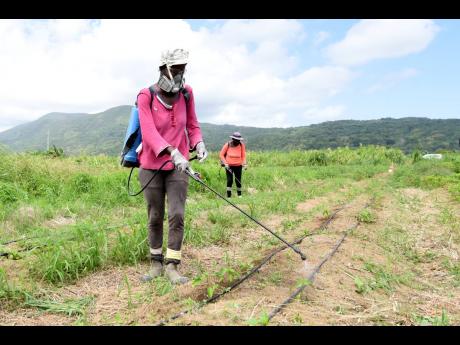Cancer cry over pesticide use at Jamaican farms
The largely unregulated use of chemicals in agriculture has spawned public-health dangers like cancer for the population, an organic farmer based in western Jamaica has charged.
In an address at Tuesday’s launch of a study on the pattern and use of agricultural pesticides and their residues in the Jamaican environment, Liz Solms of the Coalition of Concerned Citizens inveighed against commercial cultivation practices that have put a premium on high yields over traditional methods such as crop rotation.
That demand has fuelled high dependency on artificial fertiliser, pesticides, and herbicides, said Solms, who migrated to Jamaica 17 years ago and operates an organic farm on 30 acres of land.
“The end result is that the farmer and the land are hooked, much like a drug addiction,” said Solms in a speech delivered on her behalf by Jason Henzell, chairman of Jakes Hotel Villas and Spa in Treasure Beach, St Elizabeth.
“Behind all the hard work and the beauty, the agricultural landscape across Jamaica can in fact be viewed in terms of a major public-health issue. The farmer put in danger by his or her unregulated usage and proximity to agricultural chemicals, many (of them) banned elsewhere in the world.”
Cancer has been a fault line of dispute between farm workers and global agrichemical giant Montsanto, which has been hit by an avalanche of lawsuits, which has forced its parent company, Bayer, to set aside billions of dollars for litigation.
In November 2021, California’s highest court quashed a challenge by Montsanto to more than US$86 million in damages to a couple who claimed to have developed cancer after spraying the weedkiller Roundup in their yards for decades.
Monsanto has received chastening judicial rebukes for knowingly marketing a product whose active ingredient, glyphosate, could be dangerous.
Six months earlier, a federal appeals court upheld a US$25-million award against Monsanto in a lawsuit in which a California man alleged that he developed cancer from exposure to Roundup. The man had non-Hodgkin’s lymphoma.
BALANCING OF SCALES
Despite those global trends, Jamaican policymakers have not moved to tighten regulatory constraints on the use of weedkillers here, including Roundup.
Meanwhile, state minister in the Ministry of Agriculture and Fisheries, Frank Witter, has called for a balancing of the scales in chemical use and the drive to increase crop production and productivity.
With post-harvest production losses from pest infestation running as high as 40 per cent, Jamaican farmers have been heavily reliant on higher levels of pesticide use to counter that trend.
But overuse or misuse poses a grave danger beyond pest infestation, potentially compromising food safety, causing pollution of the soil and water and direct health problems, Witter warned.
“This unique study comes at a critical juncture when all areas connected to building out our agro-food system and food security are being placed in the spotlight for assessment and enhancement,” said Witter, who is member of parliament for the South East constituency of St Elizabeth, which is considered Jamaica’s Breadbasket Parish.
“Our goal at the ministry is not only to increase production but to ensure the safety of the foods for everyone.”
In her overview of the project, Professor Paula Tennant, who, along with Dr Dwight Robinson is the lead scientist on the two-year project, explained that the scope of the study is to determine the patterns and levels of abuse of agricultural pesticides imported into Jamaica as well as to establish residue levels in the environment and the food chain.
In the first phase, a baseline survey will be conducted, with special focus on the highly hazardous pesticides.
During the second phase, an assessment will be done to determine the pesticide load in Jamaica.
That will be followed by analysis of pesticide residue in samples of crops, soils, and water drawn from various sites across the island.

